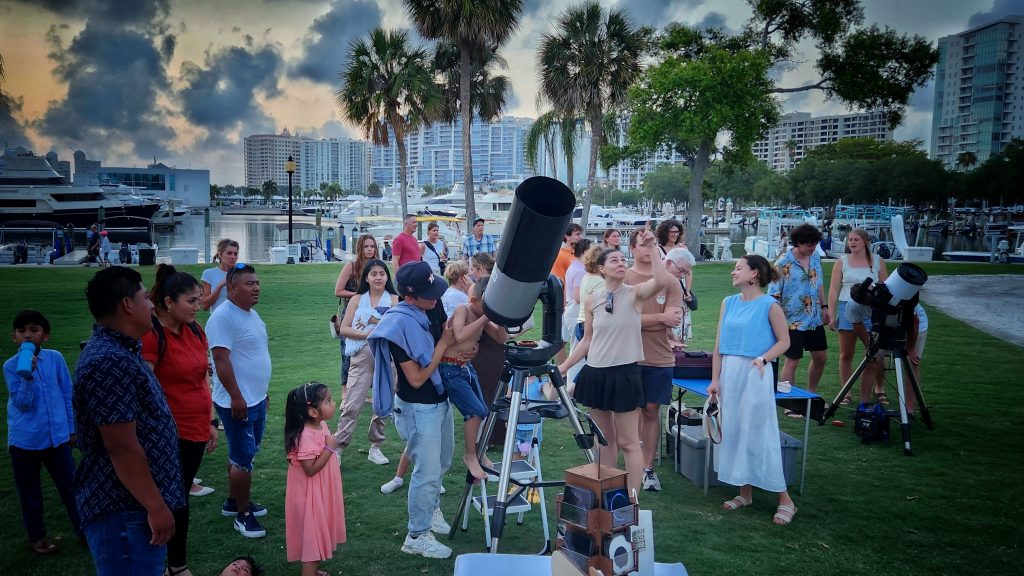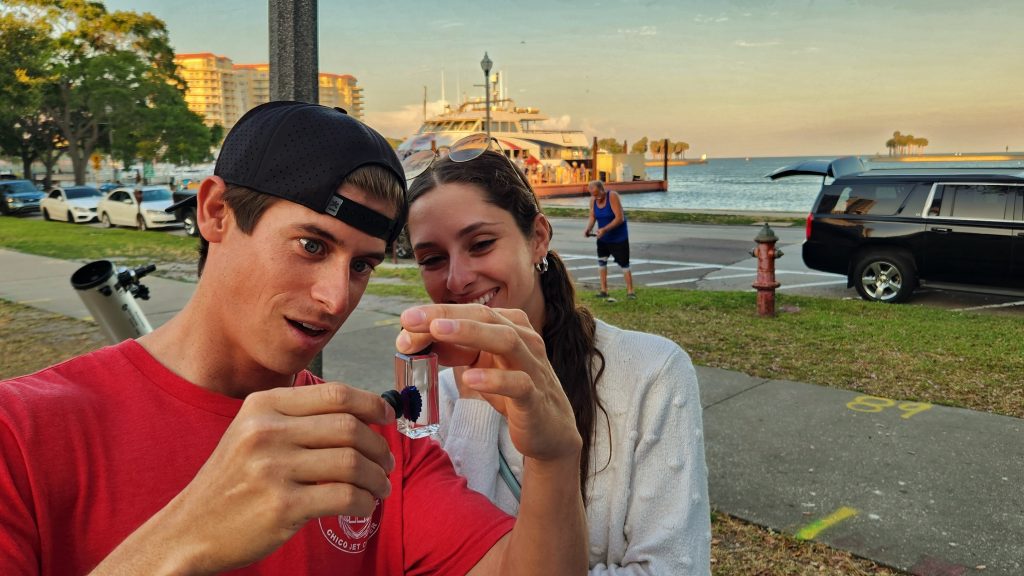On a balmy Florida evening in late 2020, as the world grappled with a pandemic, Alex Martin stood beside a telescope on a bustling sidewalk and invited passers-by to take a look. That night, Jupiter and Saturn appeared closer in the night sky than they had in the past two decades – a rare celestial event brought into sharp focus by Martin’s lenses. “We had 400 people come out,” Martin recalls, “a single-file line 2 hours long to see this spectacle.”
This moment encapsulates the mission of the Sidewalk Science Center (SSC), an unconventional science education initiative that Martin founded in 2018. SSC’s premise is deceptively simple: bring telescopes, hands-on experiments and passionate educators to public spaces where people already gather. No admission fees, no walls – just science, served up on the sidewalk.
“We just have a cart and we fill it up with tables, signs and our selection of science experiments,” says Martin. On any given day, passers-by might encounter electric circuits that light up when human chains complete them or views of the Moon’s craters through his telescope.

From sci-fi to sidewalk
The seed for SSC was planted many years earlier, in the pages of the science-fiction novels that Martin began writing at age 11. “I started incorporating real physics and science into the stories,” he says. He later launched a website to promote his books, which evolved into a science blog, and eventually into a video series where Martin would interview passers-by about science and conduct interactive experiments with them.
The turning point came in 2018, in Savannah, Georgia, where Martin noticed how people were drawn to the live experiments that he incorporated into his videos. “I kind of started ditching the video side and just set up the table and started doing experiments,” he says. “You’d get a crowd around you, and people would be doing the experiments with you.”
Relocating to Florida in late 2018 allowed Martin to expand this fledgling idea. What began as 60-70 free outreach sessions annually has exploded to a projected 226 events in 2024. SSC now boasts an array of 75 experiments and activities, and a team of 15 members that spread themselves across the Florida coast, bringing science to parks, driveways and street corners.
The experiments themselves are carefully chosen to highlight “things that happen in our everyday life that might go unnoticed unless you draw attention to it”, says Martin. A favourite demonstration of his involves placing a coiled chain in a bucket. When one end of the chain is pulled out over the rim, the rest of the chain follows, flowing out of the bucket in a continuous stream. This simple experiment demonstrates the principles of momentum and gravitational potential energy. “If you lower the bucket, you’re lowering the gravitational potential, and so the chain moves more slowly,” Martin says. “And if you raise the bucket, you’re increasing the gravitational potential, so it moves more quickly.” Controlling the chain’s movement by adjusting the height of the container never fails to fascinate onlookers, he says. This sense of wonder is precisely what SSC aims to spark in its participants, whether they’re wide-eyed kids or curious adults.
Breaking down the notion that science is “just for kids” has become one of SSC’s unofficial missions. “A lot of people have this assumption that education has to be a children-oriented thing, which is definitely not my perspective on it.”
The results speak for themselves: while children often flock to the experiments, many of SSC’s paid astronomy events cater primarily to adult groups. Almost 16,000 people have attended an SSC event in this year alone.

Impacting lives
SSC’s impact reveals itself in other ways. Martin recounts the story of a boy he recognised by his Yoshi backpack, a regular attendee for years. “He came up and said, ‘I used to be so bad at science, but ever since I started coming to you, I’ve really been trying to be better at it.’” It’s moments like these that affirm the real-world impact of SSC’s work.
Bringing science to the streets isn’t always easy. Conspiracy theorists, particularly those who believe in a flat Earth or fake Moon landings, occasionally confront the team. Martin has had to develop strategies for handling these situations, emphasising engagement with interested participants over debates with detractors. “We’re not here to debate with people,” he says.
We’re here to show people things up in the sky, or to show science experiments.”
Looking to the future, Martin aims to hold 100 events in each of the five US cities they work in, Venice, Sarasota, Bradenton, St. Petersburg, and Tampa, within the next five years. “We are also looking to bring in a representative from scientific and educational institutions once or twice a month starting in 2025,” he says, aiming to provide researchers a platform to share their work with the public.
But his larger aim with SSC is much more profound. “I think it is very much to just keep education in the public eye at all times,” says Martin. “Because when we think of education, we think of school, and we think of museums. And that’s kind of where it stops.”
SSC challenges this limited view by bringing learning opportunities to places that people already frequent, and at times that work for busy families. “We do this outside of school and work hours,” Martin says. “There are families where the parents don’t get off work until 5, 6, or 7 PM. So, they can’t take their kids to the museum.”
At its core, SSC is about more than just experiments or celestial observations. It’s about humanising science, making it tangible and immediate in a world where misinformation often spreads faster than facts.
I want people to experience the humanity that goes into science.”
Martin says. “We are people just like you – we’re not all in white lab coats, we’re not all Bill Nye, we’re not celebrities. There are just regular people all around you all the time, who might have answers to the questions that you have.”
In a time when trust in scientific institutions has been eroded, SSC offers a refreshingly direct approach: here’s a telescope, here’s an experiment – see for yourself.
Article by: Pratik Pawar


Comments are closed.